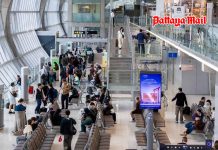BANGKOK, July 31 – Thailand has the potential to be South East Asia’s most important economic hub when its future high-speed train is in place, due to the country’s oceanic geography linking Laos and China through Singapore, a study conducted by the Thailand Development Research Institute (TDRI) said.
TDRI Distinguished Fellow Chalongphob Sussangkarn on Tuesday spoke at a seminar in the capital on the institute’s research study on benefits deriving from Thailand’s future high-speed train linking neighbouring countries and encouraging Thailand itself as the region’s centre of economy and tourism.

According to TDRI’s research, Thailand’s high-speed construction will tend to help increase the country’s trade with neighbouring nations via land transportation links.
Thailand’s trade with Laos is expected to significantly rise, in particular at the Nong Khai border checkpoint, while the trade with southern China through Thailand’s Chiang Saen border is estimated to be valued at over Bt30 billion in 2021, with transportation costs to decrease up to 20 per cent in this same year.
Tourism in the north and northeastern was expected to rise as a result of the high-speed train, Mr Chalongphob said.
However, TDRI advised the Thai government to conduct a long-term study of up to 30 years on the entire high-speed train system, particularly connecting routes from China to countries in the Association of South East Asian Nations (ASEAN), while noting that such routes will cover the logistics system of the Mekong Framework Collaboration and the ASEAN Economic Cooperation (AEC), which will greatly benefit trade.
As problems still occur on routes connecting China and Laos, both countries and Thailand should discuss investment and benefits to determine solutions.
The government should also study how the country’s industrial sector can benefit from the high-speed train investment. For instance, as Thailand is an important manufacturing base for auto parts, the government should support the industry’s foundations to add value to and make the most of the high-speed train.
The Thai government is to build four high-speed rail lines — Bangkok-Chiang Mai at 745km (costing Bt229 billion), Bangkok-Nongkhai at 615km (Bt201 billion), Bangkok-Rayong at 221km (Bt72 billion), and Bangkok-Padang Besar at 982km (Bt297 billion).




